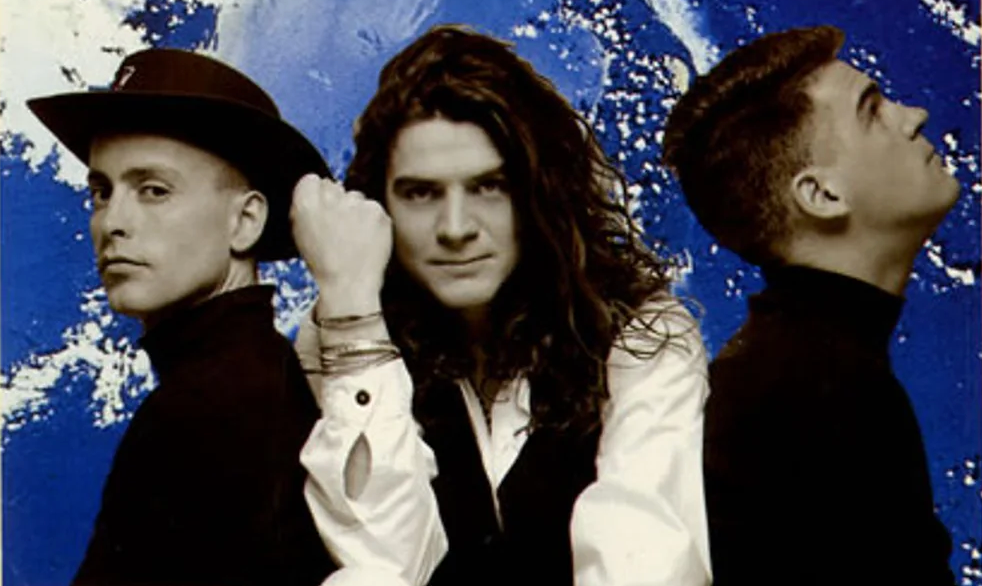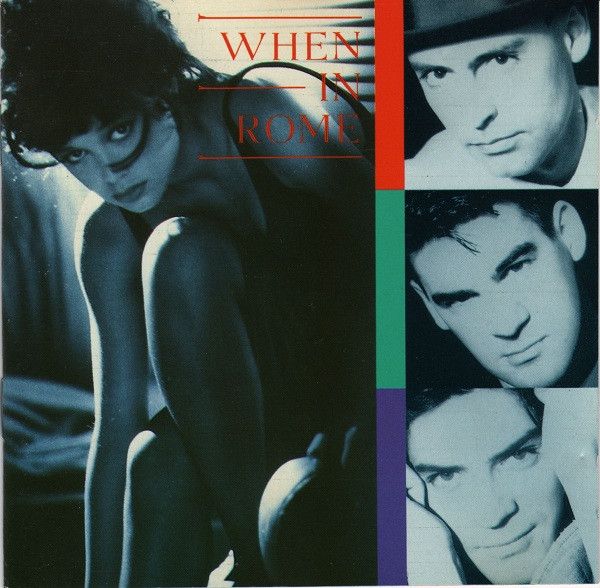One Hit Wondering – When In Rome

One Hit Wondering is a series of columns where I listen to the album of a one hit wonder, and find three songs, other than the hit, that people should hear.
The ‘80s gave us an explosion of synths, and one of the most memorable synth-pop songs of the era was “The Promise,” by English trio When In Rome.
Released in America in September of 1988, the song climbed to #11 on the Billboard Hot 100, and while it didn’t quite crack the Top 10, it still became a classic. In fact, if you turn on your local oldies radio station you’ll find it’s currently in heavy rotation.
Not bad for a song that was written in a garden shed.
When In Rome consisted of vocalists Clive Farrington and Andrew Mann, and keyboardist Michael Floreale, and the garden shed in question belonged to Farrington’s father.
Before the shed, however, and before any promises were made, When In Rome rose from the ashes of another synth-pop band – Beau Leisure.
Beau Leisure was formed in South Manchester in 1981 by Clive Farrington (bass, vocals) and Dave Powell (vocals, guitar), who were joined by Kris Saint (keys), and Tony Johnson (drums).
The band released one single, “American Beat,” with the b-side “Take The Exit,” in 1983.
Beau Leisure didn’t last long after that due to some very non-leisurely disagreements.
In an interview with Kickin' it Old School, Farrington said the band “imploded” at a local venue named Check Inn, in Altrincham, Cheshire, but that it had been a long time coming.
Wanting to start a new project, he linked up with Michael Floreale and Andy O’Connell, and after he and Floreale began writing together he contacted Andrew Mann, a beat poet who’d supported Beau Leisure during their live shows.
This was the beginning of When In Rome.
O’Connell left the group, and they continued as a trio, although they were joined by another vocalist while recording demos, a friend of Mann’s named Corinne Drewery.
Drewery didn’t stay past the demo recording stage, as she joined another project, a little band named Swing Out Sister, that would go on to their own One Hit Wonder fame.
Clearly, she was ready to “Breakout.”
Sadly, Farrington told Cryptic Rock the demos they recorded together have been lost to time, but he remembers they included a cover of the R. Dean Taylor song “There’s a Ghost In My House.”
Those demos also included an early version of “The Promise,” and netted them a deal with Elektra Records. Unfortunately, due to unforeseen circumstances, it was a short-lived deal.
As the old saying goes, timing is everything, and When In Rome signed to Elektra just one month before the label closed its London office. In an era before email, and the internet, the time difference between London and the U.S. made working with the label too difficult, so the band left to find something more local.
They wound up signing to 10 Records, a subsidiary of Virgin UK, and released “The Promise” as a 7-inch single in 1987
It totally flopped.
The 12-inch dance remix, however, took on a life of its own.
Produced by Ben Rogan, who had worked with Sade, the dance remix became popular thanks, in part, to a family member of the band.
As When In Rome lore has it, a cousin of Mike Floreale was about to begin a new job overseas in San Francisco, and before he left the UK he was given a copy of the 12-inch dance remix to take with him. The cousin then hand delivered that copy to Bay Area radio station Live 105. The reception to the song there was far better than in the UK, and Live 105 quickly put it into heavy rotation. As more people heard the song, it began to spread throughout the U.S., and started to climb Billboard’s Dance Club Play chart.
At this point, Virgin realized they had a potential hit on their hands, and had When In Rome record a full-length album.
In an interview with The Self Portrait Gospel, Floreale recalled the recording process, saying, “We used some of the finest musicians in London on the album, and they all added a little magic to the songs. My favorite memory was when members of Sade’s band came in to play percussion and sax on the song ‘Child’s Play.’ You just stood back in awe, knowing such great musicians were part of the album.”
When In Rome’s self-titled debut was released in May of 1988, with a remixed version of “The Promise” – which is the version we all recognize today – eventually being released as the lead single in September.

While “The Promise” became a hit in the U.S., the UK still wasn’t into it, as it failed to crack the Top 40 there.
Cracks, however, were already starting to from within When In Rome, and while Rome didn’t fall in a day, it took just two years from the release of their debut album for When In Rome to call it a day.
In 1990 Floreale was fired by Farrington and Mann over creative differences, and despite Virgin keeping them on their roster until 1993, the band was effectively done.
Floreale moved to the United States, Farrington and Mann moved on to other things, and everything was going fine … until Napoleon Dynamite.
Yes, the 2004 film about an awkward teenager became a tipping point for a band that hadn’t recorded together in nearly a quarter century.

The issues began in 2003, when it was discovered “The Promise” was going to be used in the film, and Floreale made sole claim to the song, despite all three members receiving equal royalties.
The popularity of the film helped create a renewed interest in When In Rome, and this is where things became really messy.
Floreale created When In Rome II in 2006 with vocalist and guitarist John Ceravolo.
Farrington and Mann teamed back up in 2009, using the name When In Rome UK.
Floreale then trademarked the name When in Rome.
Farrington and Mann challenged the trademark in court, but ultimately lost, forcing them to change their name to “Clive Farrington and Andrew Mann formerly of When in Rome” for all their U.S. gigs. They have since altered it to “Farrington+Mann Original Members of When in Rome UK” (which still has to be a bitch to fit onto a t-shirt).
While dealing with all of this, Farrington was also recording music as a solo artist, and in 2013 he released an album titled Independence. Produced by Jon Brooks, the album blends classical orchestral elements with a modern day electronic sound, and according to Farrington it’s the direction he would’ve wanted When In Rome to go in musically.
In addition to his music, in 2016 Farrington, with Pat Flanagan, wrote and published an autobiography titled Confessions of a One Hit Wonder: “The Promise” ... And the Aftermath.
Not to be outdone, Floreale’s When In Rome II released a self-titled album in 2018, and the following year they began touring with former Ultravox singer and Enuff Z’Nuff guitarist, Tony Fennell.
In 2020, Farrington and Mann teamed up with the City of Prague Philharmonic Orchestra, and the Slovenia Symphonic Film Orchestra, for a 30th anniversary orchestral version of “The Promise.”
Rewinding back to simpler times, when all three members got along, I put on the original When In Rome album, which would turn out to be their only album, and found three songs, other than “The Promise,” that you should hear.
“Total Devotion”
“Total Devotion” is a total change of pace from “The Promise.” While “The Promise” was heavy on synths, “Total Devotion” is all about the instrumentation. It sounds closer to a Huey Lewis and the News song than anything in the synth pop realm. It was also proof that When In Rome were far more than a once trick pony.
Unfortunately, the fantastic horns, keys, and piano of “Total Devotion” never saw radio airplay, and instead were left as part of this awesome album cut you had to dig deep to discover.
“Heaven Knows”
The follow-up single to “The Promise,” “Heaven Knows” bears a close musical resemblance to its predecessor, which is probably why it seemed like the obvious choice to keep When In Rome’s momentum going. Oddly, it never caught on, peaking at #95 on the Billboard Hot 100.
A great synth pop song that had all the makings of an ‘80s classic, I’ll never understand why it didn’t become a hit.
“Something Going On”
A downright bouncy pop tune, “Something Going On” must have felt like something out of left field for anyone who’d only heard “The Promise.” Much like “Total Devotion,” it showed another side of When In Rome.
Clearly, the band wasn’t limited by genre, and had they all shared a similar vision of musical experimentation perhaps they could’ve stayed together. Instead, we’re left to wonder where When In Roam would’ve roamed musically, with songs like “Something Going On” to spark our imagination.
Until next time, here’s to discovering more great music from one hit wonders!

Comments